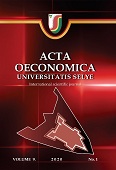EVALUATING THE IMPLICATIONS OF CORRUPTION PRACTISES ON FIRM INNOVATIVENESS CAPACITIES: EVIDENCE A 2019 SURVEY IN ALBANIA
EVALUATING THE IMPLICATIONS OF CORRUPTION PRACTISES ON FIRM INNOVATIVENESS CAPACITIES: EVIDENCE A 2019 SURVEY IN ALBANIA
Author(s): Brunilda KostaSubject(s): Business Economy / Management, Regional Geography, Political economy, Economic development, Corruption - Transparency - Anti-Corruption
Published by: Univerzita J. Selyeho, Fakulta ekonómie a informatiky
Keywords: corruption; product innovation; process innovation; Albania;
Summary/Abstract: This paper evaluates empirically the relationship between corruption and innovation, in the context of a developing economy. There are two different theses that argue on the corruption effects on firms’ innovativeness capacities. “Sanding the wheels” thesis supports the harmful impact corruption has on innovation while “greasing the wheels” thesis supports the positive impact corruption has on innovation. This papers seeks to test the “grease the wheels” thesis. To do this, data is reported from the World Bank Enterprise Survey (WBES) on 377 enterprises in Albania, collected in 2019. After controlling for other determinants of innovation, the finding is that corruptions harms firms’ innovativeness capacities. This finding supports the “sand the wheel” thesis. Theoretical and policy implications are then discussed.
Journal: Acta Oeconomica Universitatis Selye
- Issue Year: 9/2020
- Issue No: 1
- Page Range: 57-66
- Page Count: 10
- Language: English

